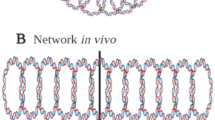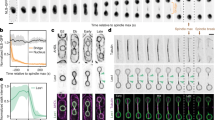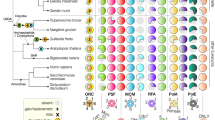Abstract
THE mitochondrial genome of Trypanosoma brucei is organized in the form of a complex catenated network of circular DNA molecules. This mass of DNA, known as the kinetoplast, is present at a unique site in the single mitochondrion, and is replicated in a discrete, periodic S phase of the cell cycle. The single-copy nature of the kinetoplast suggests that there is a mechanism ensuring segregation fidelity of replicated copies to each daughter cell. Historically, speculation regarding the nature of this mechanism has often attributed significance to the close association between the kinetoplast and the flagellum basal body. We provide here direct evidence that this mitochondrial DNA complex is indeed linked to the basal body, and segregation of the kinetoplast DNA is dependent on a microtubule-mediated separation of the new and old flagellar basal bodies during the cell cycle. This unique system may represent the remnants of an evolutionary archaic mechanism for genome segregation.
This is a preview of subscription content, access via your institution
Access options
Subscribe to this journal
Receive 51 print issues and online access
$199.00 per year
only $3.90 per issue
Buy this article
- Purchase on Springer Link
- Instant access to full article PDF
Prices may be subject to local taxes which are calculated during checkout
Similar content being viewed by others
References
Vickerman, K. Trans. R. Soc. trop. Med. Hyg. 56, 487–495 (1962).
Robertson, M. Phil. Trans. R. Soc. B203, 161–184 (1913).
Simpson, L. J. Protozool. 15, 132–136 (1968).
Molyneux, D. H. Parasitology 59, 55–66 (1969).
Lewis, D. H. J. Protozool. 22, 344–352 (1975).
Steinert, M., Van Assel, S. & Steinert, G. in Biochemistry of Parasites and Host-Parasite Relationships (ed. Van den Bossche, H.) 193–202 (Elsevier/North-Holland Biomedical, Amsterdam, 1976).
Souto-Padron, T., De Souza, W. & Heuser, J. E. J. Cell Sci. 69, 167–178 (1984).
Hiruki, T. Zentbl. Bakt. Mikrobiol. Hyg. 264, 392–398 (1987).
Woods, A. et al. J. Cell Sci. 93, 491–500 (1989).
Sherwin, T. & Gull, K. Phil. Trans. R. Soc. B323, 573–588 (1989).
Chow, K. C., Macdonald, T. L. & Ross, W. E. Molec. Pharmacol. 34, 467–473 (1988).
Patel, S. Austin, C. A. & Fisher, L. M. Anticancer Drug Des. 5, 149–157 (1990).
Shapiro, T. A. & Englund, P. T. Proc. natn. Acad. Sci. U.S.A. 87, 950–954 (1990).
Ootso, K. et al. Cancer Res. 40, 1707–1717 (1980).
Brun, R. & Schonenberger, M. Acta trop. 36, 289–292 (1979).
Sherwin, T., Schneider, A., Sasse, R., Seebeck, T. & Gull, K. J. Cell Biol. 104, 439–446 (1987).
Author information
Authors and Affiliations
Rights and permissions
About this article
Cite this article
Robinson, D., Gull, K. Basal body movements as a mechanism for mitochondrial genome segregation in the trypanosome cell cycle. Nature 352, 731–733 (1991). https://doi.org/10.1038/352731a0
Received:
Accepted:
Issue Date:
DOI: https://doi.org/10.1038/352731a0
This article is cited by
-
Inheritance of the reduced mitochondria of Giardia intestinalis is coupled to the flagellar maturation cycle
BMC Biology (2021)
-
Sequential production of gametes during meiosis in trypanosomes
Communications Biology (2021)
-
Timing and original features of flagellum assembly in trypanosomes during development in the tsetse fly
Parasites & Vectors (2020)
-
African trypanosomes
Parasites & Vectors (2019)
-
Basal body structure and cell cycle-dependent biogenesis in Trypanosoma brucei
Cilia (2015)
Comments
By submitting a comment you agree to abide by our Terms and Community Guidelines. If you find something abusive or that does not comply with our terms or guidelines please flag it as inappropriate.



